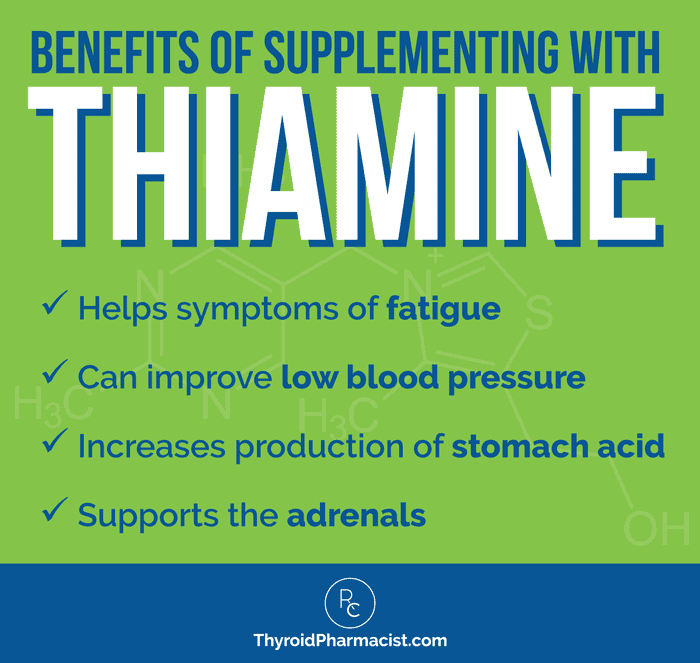
Sometimes we can get stuck on our healing journey.
We may be on a seemingly great diet, taking the right supplements, and doing everything in our power to feel better, but still feel like we’re making no progress. But, many times, we’re only one small change away from seeing a huge difference.
In my case, I was well on my way to feeling better with Hashimoto’s after changing my diet and incorporating key supplements. But I hit a wall. I continued to struggle with low energy levels, adrenal fatigue, and low blood pressure.
At a loss, I decided to take a test for nutrient deficiencies and found out that I was depleted of thiamine. A few days after starting a thiamine supplement, my energy levels began to bounce back, and I felt great!
Could thiamine be the missing link to your thyroid fatigue?
Read on to learn about:
- What thiamine is
- The thyroid fatigue and thiamine connection
- How thiamine deficiency occurs
- Testing for thiamine deficiency
- How to supplement with thiamine
What is Thiamine?
Thiamine is one of the B vitamins, known as B1. Its main responsibility is to change carbohydrates into energy. [1] Thiamine also helps with the digestion of proteins and fats, as it is necessary for the proper release of hydrochloric acid in our stomachs (which is required for proper protein digestion). [2]
Given that most people with Hashimoto’s have low stomach acid or do not release any stomach acid at all, it’s important to have optimal levels of thiamine. [3] The recommended daily allowance for thiamine is 1.1 mg for women over 19 years of age. However, this amount may not meet the needs of those with autoimmune thyroid disease.
This is because most dietary sources of B1 (fortified grains, beef liver, pork, dried milk, eggs, legumes, peas, nuts, and seeds) are omitted on grain-free healing diets, which are often recommended for those with autoimmune thyroid disease. With the exception of liver and pork, most foods containing thiamine (as listed above) are restricted on the Paleo diet, and all of them are restricted on the Autoimmune Paleo diet!
Furthermore, many people with Hashimoto’s often experience digestive problems that make absorbing nutrients difficult.
On top of all this, the B vitamins become depleted in stressful situations that often precede the development of autoimmunity, as well as in times when we are pushing ourselves, and our adrenals, to work harder. [4]
Thus, having low levels of thiamine is common in those with Hashimoto’s… and can be one of the root causes of thyroid symptoms, including fatigue!
Research on Thiamine and Thyroid Fatigue
I often scour PubMed, the largest database of scientific publications, for the latest research on Hashimoto’s, and was excited to find an article about thiamine and thyroid fatigue. Though I had already seen positive results when I took thiamine, it’s always exciting for me to see nutrient deficiencies in Hashimoto’s getting more attention in the medical literature.
Italian clinicians Dr. Antonio Costantini and nurse Maria Immacolata Pala, have hypothesized that the chronic fatigue that accompanies inflammatory and autoimmune diseases may be a result of a mild thiamine deficiency. [5] They had already found that thiamine helped relieve fatigue in people with ulcerative colitis (an autoimmune condition that affects the gut), and decided to try using thiamine in three women with Hashimoto’s who were on thyroid medications but continued to experience fatigue.
Two of the women were given an oral dose of thiamine (600 mg) per day, while the third was given an injection of 100 mg, every four days.
All of the women were given a survey to rate their fatigue before starting the thiamine, and again, the same questionnaire, 20 days into the treatment. During the second survey, all three reported that they experienced a relief in their fatigue — and two had a complete remission of their fatigue!
The woman who had the injection felt that her fatigue was lifted within six hours of receiving it, while the women who took the oral dose of thiamine felt relief within three-to-five days.
Interestingly, none of the women had thiamine deficiency on standard lab tests that are used to measure thiamine status.
How Common is Thiamine Deficiency?
In pharmacy school, we were taught that thiamine is a rare nutrient deficiency, usually found in alcoholics. Other well-known causes of thiamine deficiency may include Crohn’s disease, malabsorption (likely to be an issue for most people with Hashimoto’s and autoimmunity), anorexia, and kidney dialysis.
Certain medications, including Digoxin (used for heart conditions), diuretics — especially furosemide (also known as Lasix), as well as the seizure medication phenytoin (Dilantin), can also deplete the body of thiamine. I recently came across the link between a frequently used antimicrobial, metronidazole (Flagyl), that can cause a significant depletion of thiamine.
Thiamine deficiency has been deemed as a rare deficiency in the developed world, but this is due to the fortification of cereals and bread. If you’re on a grain-free diet, you are very likely going to be deficient in thiamine. Additionally, the thiamine added to food products is usually a water-soluble form that is less bioavailable than other fat-soluble forms (such as benfotiamine).
Furthermore, certain food products, such as black tea, coffee, raw fish, and shellfish, contain thiaminases, which are enzymes that destroy thiamine. Consuming large quantities of these foods, and eating them alongside other thiamine-containing foods, can inhibit our ability to absorb adequate levels of thiamine.
Types of Thiamine Deficiency
Severe thiamine deficiency is known as beriberi and is associated with swelling, tingling, a burning sensation in the hands and feet, confusion, trouble breathing, and uncontrolled eye movements. [6]
Severe thiamine deficiency can cause Wernicke-Korsakoff syndrome, a brain disease that can present as confusion, memory problems, and nerve damage.
But most people with Hashimoto’s never have thiamine deficiency that is this severe.
Symptoms of milder forms of thiamine deficiency include:
- Fatigue
- Irritability
- Depression
- Abdominal discomfort
- Low blood pressure
- Adrenal issues
- Trouble digesting carbohydrates
Long-term thiamine deficiency can lead to various symptoms, including mental fog, difficulty breathing, and heart damage. It can also lead to a build-up of pyruvic acid (a byproduct of glucose metabolism), in those who eat high-carbohydrate diets.
Those on low-carbohydrate diets are at a smaller risk of the build-up of pyruvic acid and may not have any symptoms — except for fatigue.
Do any of these symptoms sound familiar? If so, you may want to check your B1 levels!
Testing for Thiamine Deficiency
The standard way to check your B1 levels is by taking a blood test. You can request one from your doctor. If you are in the United States, you can also self-order the Ulta Labs – Vitamin B1 (Thiamine) test.
Unfortunately, standard lab tests for thiamine deficiency will not show if someone is mildly deficient — they only screen for severe deficiencies.
If you’ve been struggling with fatigue, low stomach acid, carbohydrate intolerance, low blood pressure, and symptoms related to your adrenals, you may have a thiamine deficiency and may benefit from extra B1 intake. (Generally, most people can supplement with thiamine without prior testing.)
Supplementing with Thiamine
To boost your B1 levels, you can try increasing your consumption of beef liver, eggs, pork, nuts, and seeds (if tolerated) to increase your thiamine levels.
However, while I love the theory that we should get all of our nutrients from foods, that’s not always possible — especially for people with Hashimoto’s who have multiple food sensitivities and digestive difficulties, or who are following a healing diet that omits many thiamine-rich foods.
Furthermore, as I mentioned earlier, thiamine, and other B vitamins, become depleted when we are experiencing stress — so even if we are eating a diet that is full of nutrients, it’s not always possible to get everything that we need from food, especially if we are also experiencing symptoms of adrenal fatigue.
Don’t get me wrong, I do think that we should get what we need, when we can, from food. However, sometimes we need an extra boost, and thiamine may be one of those boosting nutrients that can really benefit us.
For this reason, I generally recommend incorporating a high-quality supplement. The supplement I have taken for thyroid fatigue and recommend, is the highly absorbable BenfoMax by Pure Encapsulations. I recommend 600 mg per day for most people as a starting point.
As I mentioned earlier, research studies have shown that a daily 600 mg dose of thiamine, for as little as three to five days, can produce benefits such as more energy, better brain function, stabilized blood pressure, and improved blood sugar tolerance.
Plus, 36 percent of my readers whom I surveyed in 2015, said that thiamine helped them feel better… so a daily thiamine supplement may just be the key to recovering your old self!
Please note: Some people may need to increase their dosage of thiamine from 600 mg per day.
One particular study published in the Journal of Alternative and Complementary Medicine comes to mind. It looked at the effect of thiamine on patients with Crohn’s disease and ulcerative colitis, and found that effective dosages ranged from 600 mg to 1,500 per day, depending on individual body size. [7]
While 600 mg is a good daily starting dosage, you may need to increase your dosage if your weight is above 60 kg (132 lb). The researchers in this particular study defined the dosage for each patient by first administering 600 mg/day. Every two days, there was a consultation with the patient to assess the therapy. In cases where fatigue had not subsided, an increase of an additional 300 mg/day of thiamine was prescribed in addition to the 600 mg/day.
The researchers monitored each patient’s heart rate after the supplement was increased to help determine the correct dose. Researchers found that if the thiamine doses administered were excessive for the patient’s needs, the patient would experience tachycardia (an increased heart rate, where the heart would beat more than 100 beats per minute), and they would then reduce the dosage.
One patient in the study who was treated with 1,200 mg/day of thiamine, showed a mild tachycardia (rapid heartbeat) that completely regressed by reducing the dose to 900 mg/day.
Here is a guide for finding your correct dosage, based on the researchers’ finding in the study above:
For female patients:
- Patients weighing < 60 kg → Take 10 mg of B1 per kg of your weight, per day
- Patients weighing 60–65 kg → Take 14 mg of B1 per kg of your weight, per day
- Patients weighing 65–70 kg → Take 17 mg of B1 per kg of your weight, per day
- Patients weighing 70–75 kg → Take 20 mg of B1 per kg of your weight, per day
- Patients weighing 75–80 kg → Take 23 mg of B1 per kg of your weight, per day
For male patients, the doses need to be increased by one third compared to females:
- Patients weighing < 60 kg → Take 14 mg of B1 per kg of your weight, per day
- Patients weighing 60–65 kg → Take 18 mg of B1 per kg of your weight, per day
- Patients weighing 65–70 kg → Take 23 mg of B1 per kg of your weight, per day
- Patients weighing 70–75 kg → Take 30 mg of B1 per kg of your weight, per day
- Patients weighing 75–80 kg → Take 35 mg of B1 per kg of your weight, per day
***Please note that the table above is in kilograms, as it’s taken from the published article. To determine your weight in kilograms, you can use the following conversion: 1 kilogram = 2.2 pounds.
I encourage you to work with a practitioner to determine the proper dosage for your needs.
Precautions
Thiamine, in the recommended doses, is one particular supplement that is extremely safe for most people, but there are some exceptions.
Thiamine supplementation should be avoided by those with advanced cancers because tumors may steal the body’s reserves of thiamine and use it to proliferate themselves, as thiamine is necessary for cell replication. [8] If a person has thiamine deficiency and cancer, I would advise working with an integrative cancer specialist, because the dose response of thiamine has an interesting pattern in those with advanced tumors.
Giving enough thiamine to just correct the thiamine deficiency can help the tumor grow (the thiamine goes to the tumor instead of us), while mega doses of thiamine inhibit tumor growth.

My Experience with Thiamine
As I mentioned earlier, after feeling great with my dietary changes and supplements on my road to Hashimoto’s remission, I hit a wall. I should mention that I was working hard at that time at my day job, as a medication safety pharmacist. I spent every evening, weekend, and day off researching and writing a Hashimoto’s patient guide (that eventually became Hashimoto’s: The Root Cause), starting a blog, and answering people’s questions.
I had already been eating a Paleo diet, and my digestion was 90 percent better, but I continued to struggle with my adrenals, energy levels, and blood pressure. Sometimes my blood pressure would be as low as 90/60 mmHg! My doctor would wonder how I was even walking!
I decided to bite the bullet and ordered a really expensive advanced functional medicine nutrient analysis test for myself, that used a unique technology to pick up nutrient deficiencies that traditional tests miss. (This was the Spectracell test that I discuss in my book, Hashimoto’s: The Root Cause.)
I had already done a lot of research on the nutrient depletions that were causing some of my symptoms, including glutamine, zinc, and the B vitamins, so many of the results were not surprising — except for one: I was deficient in thiamine!
I took three capsules per day (600 mg) for one month, and then reduced my dose to one capsule per day (200 mg) as I continued to work on my digestion, absorption, and eating more liver.
A few days after starting thiamine, my energy began to bounce back, my blood pressure normalized, and I was able to reduce my dose of Betaine with Pepsin, which I had been taking to help me digest proteins.
Over the years, I have continued taking thiamine on and off, with varying doses throughout pregnancy and postpartum, and continue taking it to this day. I have found that I needed more of it, with gaining weight in pregnancy and the postpartum period. I’ve also been astonished by the body of research on the various conditions responsive to thiamine, including POTS, poor appetite, failure to thrive, and numerous other “untreatable” conditions.
A deficiency of B vitamins can contribute to a range of adrenal symptoms as well, and this includes thiamine. It’s one of the nutrients that I recommend for those experiencing adrenal dysfunction, and I cover it in my latest book, Adrenal Transformation Protocol.
Another surprising use of thiamine could be helping with bad dreams! I was intrigued when one of my readers shared this with me:
“I take [thiamine] whenever the heck I feel like it. 🙂 It helps me with nightmares, so I even take it in the middle of the night if I wake up after a gruesome dream.”
It turns out that thiamine has been used successfully to treat people with anxiety disorders, including symptoms manifesting as chronic fatigue, insomnia, and nightmares. [9]
Furthermore, I’ve learned about the subtle differences and benefits of various forms of thiamine, including benfotiamine (which I recommend), the more commonly used thiamine, and synthetic versions that can cross the blood-brain barrier and have nootropic and neurological benefits.
My hope is that thiamine can be just as helpful for my readers.
The Takeaway
Often, people with Hashimoto’s will be started on thyroid hormones but will continue to feel tired. Fatigue is a common symptom of an underactive thyroid, but it’s also a symptom of many other associated conditions, including adrenal fatigue, food sensitivities, and various nutrient deficiencies.
As we peel back the layers of autoimmunity, some of us will be able to reverse our condition just by getting off gluten or eating a clean diet (like the Paleo diet or the Autoimmune Paleo diet).
Others will continue to struggle. This, of course, is where bio-individuality, functional medicine, and nutrition come into play.
If you’ve optimized your thyroid medications, eliminated food sensitivities, and improved your gut health, but are still struggling with fatigue, I encourage you to try a thiamine supplement and see if it can help you like it’s helped so many people with Hashimoto’s.
Who knows… it could be the missing puzzle piece you’ve been looking for!
For more information on overcoming fatigue, download my free eBook below!
As always, I wish you the very best on your health journey!
Have you tried thiamine? I’d love to hear how it worked for you!
P.S. You can also download a free Thyroid Diet Guide, 10 thyroid-friendly recipes, and the Nutrient Depletions and Digestion chapter of my first book for free, by signing up for my weekly newsletter. You will also receive occasional updates about new research, resources, giveaways, and helpful information.
For future updates, make sure to follow me on Facebook, Instagram, Pinterest, and TikTok!
References
[1] Thiamin: MedlinePlus Medical Encyclopedia. NIHNational Library of Medicine. Available at: http://www.nlm.nih.gov/medlineplus/ency/article/002401.htm. Accessed July 25, 2017
[2] Levin LG, Mal’tsev GIu, Gapparov MM. Vliianie nedostatochnosti tiamina na sekretsiiu soliarnoĭ kisloty v zheludke [Effect of thiamine deficiency in hydrochloric acid secretion in the stomach]. Vopr Pitan. 1978;(5):36-40.
[3] Ebert EC. The thyroid and the gut. J Clin Gastroenterol. 2010;44(6):402-406. doi:10.1097/MCG.0b013e3181d6bc3e
[4] Stough C, Simpson T, Lomas J, et al. Reducing occupational stress with a B-vitamin focussed intervention: a randomized clinical trial: study protocol. Nutr J. 2014;13(1):122. Published 2014 Dec 22. doi:10.1186/1475-2891-13-122
[5] Costantini A, Pala M. Thiamine and Hashimoto’s Thyroiditis: A Report of Three Cases. The Journal of Alternative and Complementary Medicine. 2014;20(3):208-211. doi:10.1089/acm.2012.0612.
[6] Wiley KD, Gupta M. Vitamin B1 Thiamine Deficiency. [Updated 2021 Jun 21]. In: StatPearls [Internet]. Treasure Island (FL): StatPearls Publishing; 2021 Jan-. Available from: https://www.ncbi.nlm.nih.gov/books/NBK537204/ Accessed December 11, 2019
[7] Costantini A, Pala MI. Thiamine and fatigue in inflammatory bowel diseases: an open-label pilot study. J Altern Complement Med. 2013 Aug;19(8):704-8. doi: 10.1089/acm.2011.0840. Epub 2013 Feb 4.
[8] Comín-Anduix B, Boren J, Martinez S et al. The effect of thiamine supplementation on tumour proliferation. European Journal of Biochemistry. 2001;268(15):4177-4182. doi:10.1046/j.1432-1327.2001.02329.x.
[9] Cornish S, Mehl-Madrona L. The role of vitamins and minerals in psychiatry. Integr Med Insights. 2008;3:33-42.
Note: Originally published in February 2015, this article has been revised and updated for accuracy and thoroughness.


